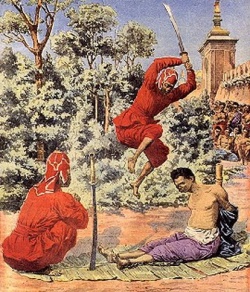Capital punishment
Capital punishment (brahmadaṇḍa or daṇḍavadha) is the infliction of death as a judicial punishment. The Tipiṭaka describes a number of gruesome ways criminals were executed during the Buddha’s time (M.I,87). It also records for us the words of a judge condemning a thief to death. ‘Tie his hands behind his back with strong rope, shave his head, parade him through the streets to the sound of a harsh drum, take him out by the south gate and chop his head off!’ (D.II,322). Horrible and heart-rending scenes were common at the places of execution. We read of a monk pleading with an executioner to dispatch a criminal quickly so as ‘to put him out of his misery.’ (Vin.III,86).
The Buddha objected to capital punishment mainly because it involves cruelty and killing, thus contravening the first Precept. He said that judges who hand down cruel punishments, tormentors and executioners all practise wrong, literally ‘cruel’ livelihood (kurūra kammanta) and create much negative kamma for themselves (S.II,257).
Buddhism would also say that it is better to try to reform criminals and turn them into productive members of society rather than execute them. A king in the Jātaka says of a wrongdoer: ‘I punish people according to justice but also with sympathy.’ (Ja.III,442). This same point was made by the great Buddhist philosopher Nāgārjuna in the 1st century CE: ‘Just as a son is punished out of the desire to make him worthy, so punishment should be inflicted with compassion and not through hatred or greed. Once you have judged angry murderers you should banish them without killing them.’ At least during the Buddhist period in India capital punishment seems not to have been the norm. The Chinese pilgrim Hiuen Tsiang who traveled through the subcontinent during the 7th century wrote: ‘The kings of India believe deeply in the Buddha’s teachings and do not use the death penalty in governing the people. Even persons guilty of serious offences are not executed.’ Today all Buddhist countries have the death penalty, although there were periods in the past when it was abolished. Sri Lanka has had a moratorium on capital punishment since1997.
